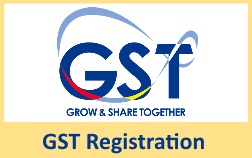From Start to Finish: The Ultimate Roadmap to GST Registration for Services Looking For Financial Stability
Browsing the intricacies of Item and Provider Tax (GST) enrollment is an essential step for companies aiming for economic stability. Damaging down the roadmap into workable actions can streamline the registration trip for services looking to boost their monetary standing.
Understanding GST Essentials
Delving into the basic principles of Product and Provider Tax (GST) is vital for obtaining a comprehensive understanding of its ramifications on services and the economic situation. Input Tax Credit Rating (ITC) is a significant attribute of GST, permitting organizations to declare credit for taxes paid on inputs, lowering the general tax burden. Understanding the fundamentals of GST is critical for businesses to abide with tax obligation policies, handle their funds effectively, and contribute to the nation's economic development by getting involved in a clear tax obligation system.
Qualification Standards for Enrollment
To sign up for GST, companies must meet particular eligibility standards developed by the federal government. The key qualification need is that any company included in the supply of goods or solutions with an annual accumulation turn over over the threshold limitation established by the authorities need to sign up for GST. As of the existing policies, the threshold limit for GST registration is an annual aggregate turnover of 40 lakhs for organizations running within a state, other than for unique category states where the limit is 20 lakhs. Furthermore, certain businesses are required to register for GST irrespective of their turnover, such as interstate providers, laid-back taxed persons, and services reliant pay tax obligation under the reverse charge device. It is essential for organizations to completely assess their turnover and purchase kinds to establish their GST enrollment responsibilities properly. Failing to register for GST when eligible can cause fines and legal consequences, making it essential for services to stick to the defined eligibility criteria.
Records Required for Registration
Having actually satisfied the qualification criteria for GST registration, businesses must currently ensure they have the requisite papers in position to proceed with the enrollment procedure efficiently. The records required for GST registration typically consist of evidence of company constitution, such as partnership action, enrollment certification, or unification certification for various sorts of companies. Furthermore, companies need to supply papers establishing the major workplace, such as a rental agreement or electrical power expense. PAN card of business, along with the identification and address proof of promoters/partners/directors, are vital for verification functions. Checking account statements, along with canceled cheques or a duplicate of the financial institution passbook, are needed to verify the monetary details provided throughout enrollment. Moreover, companies need to have digital trademarks prepared for the licensed signatory. Making sure all these files are arranged and easily available will certainly accelerate the GST registration procedure, allowing businesses to abide by tax obligation policies flawlessly.
Step-by-Step Enrollment Process
Beginning the GST enrollment process includes a collection of structured actions to make certain a smooth and certified enrollment for companies. The primary step is to go to the GST site and fill out the registration kind with accurate details of the service entity. Following this, the applicant obtains a Momentary Referral Number (TRN) which is used to return to the application procedure if it's not completed in one go.
Following, all required files based on the list provided by the GST portal requirement to be published. These records normally include proof of organization identification, enrollment and address evidence of promoters, monetary statements, and service entity's frying pan card.

Post-Registration Conformity Standards

Verdict
Finally, businesses looking for monetary stability has to understand the essentials of GST, fulfill eligibility criteria, gather needed files, adhere to the step-by-step enrollment procedure, and follow post-registration guidelines - Best GST registration services in Singapore. By sticking to these actions, businesses can make sure compliance with tax obligation regulations and keep monetary stability in the future
Furthermore, particular organizations are needed to sign up for GST irrespective of their turnover, such as interstate providers, informal taxed individuals, and businesses liable to pay tax obligation under the reverse fee system.Having actually met the eligibility requirements for GST registration, services must now ensure they have the requisite records in area to proceed with the registration process efficiently. The documents needed for GST enrollment generally consist of proof Discover More of organization constitution, such as collaboration action, enrollment certification, or consolidation certification for various types of services. Additionally, organizations require to give files establishing the primary location of company, such as a rental agreement or electricity bill.Starting the GST registration my latest blog post process includes a collection of structured steps to ensure a certified and smooth registration for companies.